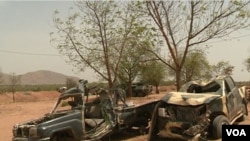At least six Cameroonian troops are reported dead following a wave of fighting with Boko Haram terrorists on the central African state's northern border with Nigeria. The attacks followed a visit in which Cameroon's chief of defense staff declared that his military had drastically reduced Boko Haram's ability to attack.
Dimgui Issa, a 56-year-old trader, said he escaped with three of his family members from the Cameroon village of Soueram that shares a boundary with lake Chad to the Cameroon town of Kousseri after dozens of Boko Haram terrorists attacked their location shooting indiscriminately.
He said the terrorists killed so many, torched dozens of houses and food items, stole goats, sheep and money. He said many people are fleeing because the terrorists have shown that they can strike at any moment and escape through the porous borders.
Local media has reported that at least six soldiers were killed and nine wounded in the attacks on several Cameroon military border posts that started last Friday and ended in the early hours of Sunday. The attackers also left with huge amounts of ammunition and weapons. The military has confirmed there were attacks but did not say how many troops were killed. It said however the attackers suffered heavy casualties.
The attacks took place just after General Rene Claude Meka, Cameroon's chief of defense staff, visited the central African state's northern border with Nigeria and said his troops had drastically reduced Boko Haram's ability to regroup and organize large scale attacks on military posts as very few have been reported within the past two months.
Meka said after the fresh attacks, they have taken additional security measures to protect the population. He said troops have been redeployed.
He said the morale of Cameroon's military fighting Boko Haram terrorists has not been dampened by the attacks as the troops are more than ever before determined not only to consolidate their achievements but to completely crush the fighters. He said his troops have been redeployed and the situation is under control.
Meka said the attacks on military bases show that that the terror group still has access to weapons illegally circulating in the region.
Twenty-seven attacks targeting travelers and villagers were also reported within the past two weeks. The fighters seized money and food and held 6 people for ransom. Their whereabouts are not known.
Daouda Saidou, conflict resolution specialist at the University of Ndjamena in Chad, says insecurity is increasing in areas where Boko Haram attacks took place because many youths who joined the terrorists, but fled after promises of better living conditions were not met, are unemployed. He says it is imperative for states affected by Boko Haram terrorism to create job opportunities for young people.
"Thousands of people, especially young men joined Boko Haram. It is may be time to think about how the states are going to cope with these young people," he said.
The Boko Haram jihadist group began its bloody insurgency in northeastern Nigeria in 2009, and it spread into neighboring Niger, Chad and Cameroon, prompting a regional military response. More than 27,000 people have been killed and two million others displaced, sparking a dire humanitarian crisis in the region.





